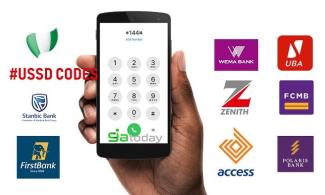
The rift between Nigerian banks and telecom operators over the N120billion USSD dispute appears unlikely to be resolved anytime soon, as the parties continue to differ on technical concerns pertaining to the money.
The Central Bank of Nigeria, CBN, stated on Monday that the dispute between the country's telecommunications operators and Deposit Money Banks, DMBs over earnings on the Unstructured Services Data, USSD, was caused by a simple misunderstanding of what constitutes a successful transaction from the bank and telco perspectives.
CBN acknowledged being aware of the protracted issue and has been working with all stakeholders to reach a peaceful resolution.
Dr. Isa AbdulMumin, CBN's Acting Director of Corporate Communications, stated, “Indeed, it was due to the direct intervention of the CBN, particularly the CBN Governor, in March 2021, that a per session price of N6.98, including to settle any outstanding fees, was agreed between the banks and telcos.
“As far as we are aware, since 2021, DMBs continue to collect the USSD fees and remit same on behalf of the telcos based on that agreement. We understand the latest dispute concerns technical issues regarding definition of a successful transaction from a bank and telco perspective” he added.
However, the telcos say the banks are playing the ostrich, hiding on technical misunderstanding to abdicate their responsibilities and breach business agreement.
The Chairman of Association of Licensed telecom Operators in Nigeria, umbrella body of the telcos, Engr Gbenga Adebayo said: “We are not backing down this time around. We don’t want to know what excuses they are giving for owing such a humongous amount, what would make sense is for them to pay.
“We have given the banks notice according to the terms of agreement we have with each bank and at the expiry of the notice, we will withdraw services fully, no going back” he added.
Adebayo added that depending on the terms of the telcos' agreements with different banks, some received two days' warning, while others received one week's notice, and still others received one month's notice. He went on to say that the warning was intended to allow customers time to organise themselves and clear their bills before losing access to USSD services entirely.
Recall that the Nigerian Communications Commission, NCC, granted telecoms permission over the weekend to discontinue support for the Unstructured Supplementary Service Data (USSD) platform from banks.
The withdrawal implies that bank customers will no longer be able to access mobile phone operations such as fund transfers via short codes, checking bank records and account balances, and other services that can even be accessible without data or internet connections.
The NCC permission came in response to the telcos' mounting debt, which they claimed had reached N120 billion.
Vanguard learnt that the Minister of Communications and Digital Economy convened a conference on Thursday between the NCC, telcos, and banks in the hopes of finding a common ground, but the banks and their regulator refused to attend.
In response to Vanguard's enquiry, CBN said that the disagreement stems from a misunderstanding of the proper technical billing technique.
AbdulMumin said: “USSD fees are charged by DMBs using an automated system which bills the customer for a successful transaction only after a banking service is consumed. For the Telcos, a successful transaction happens once the customer has dialed the USSD short-code which may not lead to the consummation of a banking service.
“Whilst such truncated transactions are not registered on the DMBs collection platform and thus not billed to bank customers, telcos expect the DMBs to charge customers once the short-code is dialed, whether or not a financial transaction is consummated.
“At a recent meeting of the DMBs and Telco representatives chaired by the Governor, CBN to resolve the issue, he acknowledged the telcos right to collect all legitimately earned fees due to them and to recover their cost. Following discussion the direct billing model was proposed as a lasting solution to the issue. This would enable telcos full visibility of USSD transactions and allow them to charge their customers directly. The feasibility of the model is still being worked out by the relevant stakeholders. “USSD is a critical channel leveraged primarily by the financially excluded, vulnerable and critical mass. The CBN remains committed to ensuring that the areas of contention related to collection of telco charges for USSD are resolved in the interest of the financial system and overall economy” he added.